|
|
|
Sort Order |
|
|
|
Items / Page
|
|
|
|
|
|
|
| Srl | Item |
| 1 |
ID:
077214
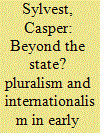

|
|
|
|
|
| Publication |
2007.
|
| Summary/Abstract |
The relationship between pluralism and internationalism is an interesting historical theme on the borderline between international relations and political theory. Intuitively the two ideologies seem to enjoy a close relationship, and at an abstract level they were both concerned with achieving political order with a minimum of central authority. However, the historical and theoretical interconnections between pluralism and (liberal) internationalism in Britain remain largely unexplored. This article attempts to fi ll this lacuna in intellectual history. Although both took shape within the confines of the same progressive intellectual agenda, the article strikes a cautious note about establishing too close a link between pluralism and internationalism, especially in the years following the Great War. This sceptical conclusion reflects not only the different preoccupations and changing nature of both pluralism and internationalism in the opening decades of the twentieth century, but also their complex theoretical relationship.
|
|
|
|
|
|
|
|
|
|
|
|
|
|
|
|
| 2 |
ID:
140873
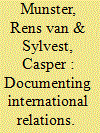

|
|
|
|
|
| Summary/Abstract |
International Relations (IR) is taking a stronger interest in visual practices and representations both as popular imaginaries that shape how we understand and act in the world and as vehicles for teaching empirical events and abstract concepts. The genre of documentary film has, however, received virtually no attention, which is striking given the last decade's explosion of widely circulated documentaries revolving around questions of central importance to IR. In this article we argue that IR needs to take documentary film-making seriously as a separate and significant medium of representation that—moving smoothly between fact and fiction, education and entertainment—directly intervenes in international politics by laying claim to (parts of) truth and reality. To this end, we introduce an analytical framework based on the idea of arrangements of perceptibility, a term that refers to the creative arrangement of sensorial perceptions (saying and showing) in documentary film. We distinguish between three such arrangements, each characterized by a specific theoretical modality (reality, truth, doubt), educational model (instruction, facilitation, problematization), and political efficacy (exposition, disclosure, destabilization). This framework enables a critical analysis of the politics of documentary film, which we demonstrate through a reading of recent documentary films about global politics
|
|
|
|
|
|
|
|
|
|
|
|
|
|
|
|
| 3 |
ID:
052405
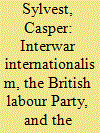

|
|
|
|
|
| Publication |
June 2004.
|
| Summary/Abstract |
This article questions two interrelated myths pertaining to the interwar internationalism of the British Labour Party and the theories of so-called idealists in the academic discipline of International Relations (IR). In IR, interwar "idealists" are (in)famous for a detached and utopian approach to international politics. Conventional historiographical verdicts on the international policy of the Labour Party in the interwar period suggest that the party was the practical mirror of this naïve international outlook. In fact, the two themes are connected, most notably through Labour's Advisory Committee on International Questions. This article brings the study of Labour's internationalism and the international theories of purported idealists together by focusing on debates on the League of Nations and the use of force. The analysis reveals that conventional historiographical narratives are inadequate and too simplistic for grasping the diversity of Labour's internationalism and interwar progressivist ideas about international politics in general.
|
|
|
|
|
|
|
|
|
|
|
|
|
|
|
|
| 4 |
ID:
085419
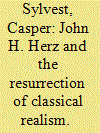

|
|
|
|
|
| Publication |
2008.
|
| Summary/Abstract |
This article argues that the political theory of John H. Herz - best known in International Relations (IR) for the invention of the concept of the security dilemma - reveals a sophisticated body of thought deeply relevant to the ongoing attempt to resurrect classical realism. Like other forms of classical realism, the Herzian variant was strategic and rhetorical in character. Beneath its realist posture we find a liberal ideology focused on achieving order, progress and justice in international politics. Although this positive project began from a pessimistic rendering of the political, Herz's political theory was never fatalistic.
|
|
|
|
|
|
|
|
|
|
|
|
|
|
|
|
| 5 |
ID:
179325
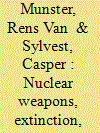

|
|
|
|
|
| Summary/Abstract |
In the Anthropocene, International Relations must confront the possibility of anthropogenic extinction. Recent, insightful attempts to advance new vocabularies of planet politics tend to demote the profound historical and intellectual links between our current predicament and the nuclear age. In contrast, we argue that it is vital to revisit the nuclear-environment nexus of the Cold War to trace genealogies of today's intricate constellation of security problems. We do so by reappraising the work of Jonathan Schell (1943–2014), author of The Fate of the Earth (1982), who came to regard extinction as a defining feature of the nuclear age. We show how a deep engagement with nuclear weapons led Schell to an understanding of the Earth as a complex, delicate ecology and fed into a sophisticated, Arendtian theory of extinction. Despite its limitations and tensions, we argue that Schell's work remains deeply relevant for rethinking human–Earth relations and confronting the Anthropocene.
|
|
|
|
|
|
|
|
|
|
|
|
|
|
|
|
| 6 |
ID:
082194
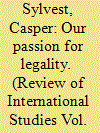

|
|
|
|
|
| Publication |
2008.
|
| Summary/Abstract |
This article deploys a historical analysis of the relationship between law and imperialism to highlight questions about the character and role of international law in global politics. The involvement of two British international lawyers in practices of imperialism in Africa during the late nineteenth century is critically examined: the role of Travers Twiss (1809-1897) in the creation of the Congo Free State and John Westlake's (1828-1913) support for the South African War. The analysis demonstrates the inescapably political character of international law and the dangers that follow from fusing a particular form of liberal moralism with notions of legal hierarchy. The historical cases raise ethico-political questions, the importance of which is only heightened by the character of contemporary world politics and the attention accorded to international law in recent years.
|
|
|
|
|
|
|
|
|
|
|
|
|
|
|
|
| 7 |
ID:
136102
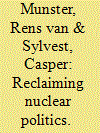

|
|
|
|
|
| Summary/Abstract |
As nuclear weapons are again becoming the subject of critical scholarship and progressive activism, this article seeks to widen the perspective of critical security studies in relation to nuclear weapons and to provide a better understanding of the historical precursors of current ambitions. We do so by focusing on the central decade of the thermonuclear revolution (ca 1952–1963) and on a body of thought we term ‘nuclear realism’. Nuclear realists were united by the central conviction that liberal modernity could survive collective suicide only by radically rethinking and transforming its foundations. Günther Anders, John Herz, Lewis Mumford and Bertrand Russell take centre stage, and we highlight that the central pillars in their project of nuclear critique was a dissection of the legacy of the Enlightenment and an incisive examination of its implications for (international) politics in the nuclear age. These dimensions came together in their critique of the prevailing concept of deterrence. In an attempt to reclaim nuclear politics for a wider public, nuclear realists stressed the absolute centrality of imagination as a strategy for unmasking the power and rationality of a growing national security establishment, on the one hand, and bringing a distinct, alternative vision of global politics and security into view, on the other. This comprehensive yet multifaceted project, while afflicted by its own challenges, is deeply relevant for today’s nuclear politics.
|
|
|
|
|
|
|
|
|
|
|
|
|
|
|
|
|
|
|
|
|